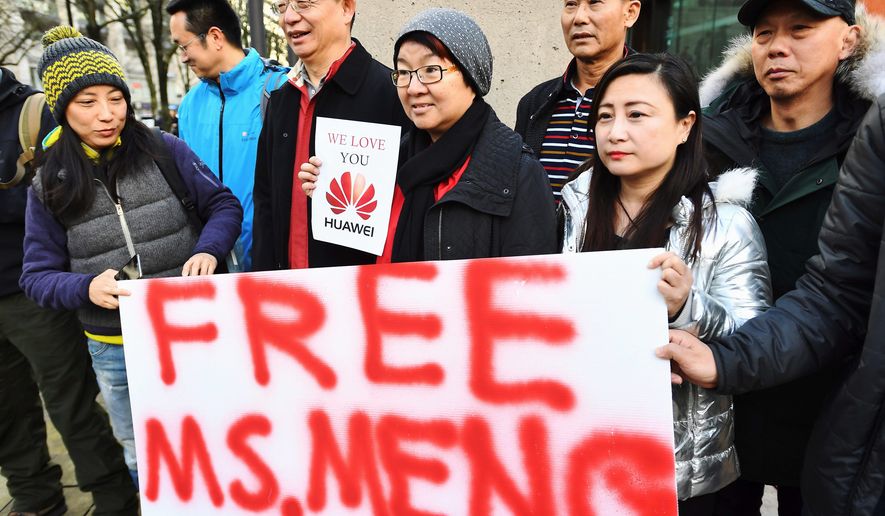Washington and Beijing labored to keep trade negotiations on track Monday amid diplomatic and legal flaps jolting business relations between the two economic superpowers, including a Chinese court ruling against Apple.
Siding with Qualcomm in a patent dispute, the Fuzhou Intermediate People’s Court in China granted an injunction blocking the import and sale of some iPhones.
The ruling fueled speculation that China was punishing the U.S. company in retribution for the arrest in Canada, at the request of the U.S., of Huawei Chief Financial Officer Meng Wanzhou, the daughter of the company’s founder and a business star in her own right in China.
Ms. Meng was in court seeking release on bail Monday as the U.S. is trying to extradite her to face fraud charges related to violating sanctions against Iran. She faces up to 30 years in prison if extradited to the U.S. and convicted.
After a day of arguments in a provincial court in Vancouver, the judge extended the hearing to Tuesday.
Still, the two governments appeared intent on keeping the legal tangles separate from the trade truce that President Trump and Chinese President Xi Jinping struck Dec. 1 over a steak dinner in Buenos Aires.
Washington and Beijing are looking for a trade deal before a new round of Mr. Trump’s tariffs takes effect in March.
The trade talks and legal cases remain separate — for now, said Juscelino F. Colares, associate director of the Frederick K. Cox International Law Center at Case Western Reserve University.
“This does not mean these two issues will remain unconnected for too long. Diplomatic disputes tend to have a dynamic of their own and, in the eyes of China’s authorities, this could become a bargaining chip,” he said.
Mr. Colares noted that the sales of older iPhone models banned under the injunction reportedly make up more than a third of Apple’s sales in mainland China, making the ban a potential large bargaining chip.
“On the Huawei side of the dispute, the more imminent concern is the arbitrary arrest of U.S. tech executives by Chinese authorities. This could definitely complicate the current strained relations between the United States and China,” he said.
Beijing was putting more pressure on Canada than the U.S., warning that Canada would pay a “heavy price” if Ms. Meng was not released.
However, Chinese Vice Foreign Minister Le Yucheng said in a statement that the U.S. action was “vile in nature” and a violation of a Chinese citizen’s legitimate rights, according to the state-run Xinhua News Agency.
Ms. Meng was arrested Dec. 1, the same day Mr. Trump and Mr. Xi met in Buenos Aries, where the two leaders were attending the Group of 20 summit. White House officials said Mr. Trump was unaware of plans for the arrest at the time of the dinner meeting.
In the other legal battle, the Qualcomm-Apple dispute has been in court for about a year.
Qualcomm, the biggest chip maker for cell phones and a major supplier to Huawei, accused Apple of infringing on patents for features related to resizing photographs and managing apps on a touch screen.
Apple downplayed the extent of the injunction.
“Qualcomm’s effort to ban our products is another desperate move by a company whose illegal practices are under investigation by regulators around the world,” the company said in a statement. “All iPhone models remain available for our customers in China. Qualcomm is asserting three patents they had never raised before, including one which has already been invalidated. We will pursue all our legal options through the courts.”
Apple said it had filed a request for reconsideration with the court, the first step in appealing the ban. To stop the sale of phones, Qualcomm separately will have to file complaints in what is known as an enforcement tribunal, where Apple will also have a chance to appeal.
Apple shares were up about 1 percent at $169.60, recovering from an early drop when it became clear phones were still on sale. Qualcomm shares were up 2.2 percent to $57.24.
• This article is based in part on wire service reports.
• S.A. Miller can be reached at smiller@washingtontimes.com.




Please read our comment policy before commenting.